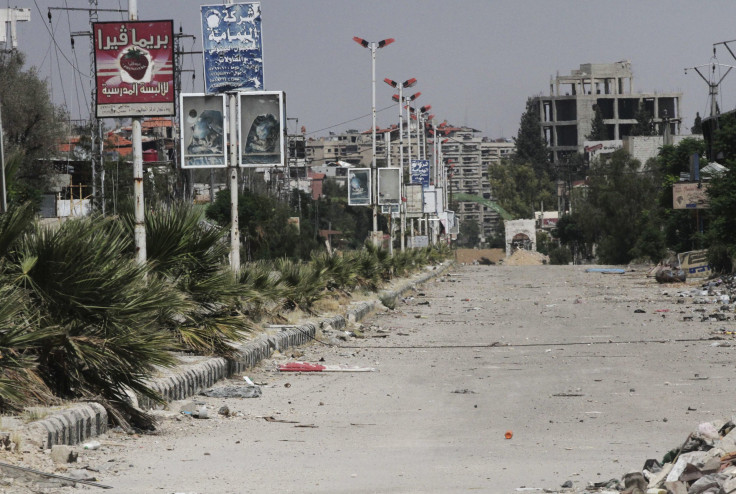Obama Authorizes US Surveillance Flights Over Syria, Possible Prelude To Attacking ISIS

Update as of 5:11 a.m. EDT: The United States has started flying surveillance flights over Syria after President Barack Obama approved it, Associated Press reported, citing U.S. officials.
Army Gen. Martin Dempsey, chairman of the Joint Chiefs of Staff, told reporters in Kabul on Tuesday that the U.S. wants to get a better understanding of militants' positions in Syria, but did not speak elaborate on the surveillance flights, the report said.
"Clearly the picture we have of ISIS on the Iraqi side is a more refined picture," Dempsey reportedly said, referring to the former name of the Islamic State. "The existence and activities of ISIS on the Syrian side, we have ... some insights into that but we certainly want to have more insights into that as we craft a way forward."
President Barack Obama has approved surveillance flights over Syria as a possible prelude to attacking Islamic State forced there, The New York Times, CNN and other media reported Monday evening.
"There is no decision yet to do strikes, but in order to help make that decision, you want to get as much situational awareness as possible," a source told the Wall Street Journal. The information gathered would supplement what already is being collected by satellites and other sources.
The White House would not comment on Obama's decision to authorize surveillance flights over Syria, according to the Associated Press, which also reported the move.
The Islamic State, formerly known as the Islamic State of Iraq and Syria, or ISIS, has seized vast swaths of land in northern and eastern Syria and northwestern Iraq in recent months, and conducted mass executions and ethnic cleansing. Its capture of the Mosul Dam in Iraq and push into Kurdish territory prompted President Barack Obama to approve limited airstrikes earlier this month that enabled the Kurds to retake territory.
The Journal said the U.S. Central Command wants more surveillance aircraft so further IS targets can be identified. The report said at least some secret flights already have been conducted with drones and manned aircraft, which led to a failed effort to rescue Americans being held by the extremists.
Pentagon spokesman Rear Adm. John Kirby said Monday, while speaking in general terms, that in order to conduct operations over Syria "you certainly want to get as much of a view on the ground as you can. You want as much situational awareness as you can," CNN reported.
"Satellites can provide you good visibility, but you always want closer eyes on target if you can," Kirby added.
Gen. Martin Dempsey, chairman of the Joint Chiefs of Staff, said last week that the Islamic State would eventually need to be addressed on "both sides of what is essentially at this point a non-existent border" between Syria and Iraq, Reuters reported.
Dempsey's spokesman confirmed Monday that options against IS were under review and stressed the need to form "a coalition of capable regional and European partners."
IS released a video last week of the beheading, apparently in Syria, of American photojournalist James Foley. During the video, a black-clad figure said the execution was in retaliation for the bombings. The execution prompted further bombings. The U.S. administration vowed to defeat the group, calling it a "cancer" that needs to be eliminated.
At the daily White House press briefing, spokesman Josh Earnest said Obama has yet to make a decision on whether to widen the bombing mission. Asked if bombing IS in Syria would help the embattled dictator Bashar Assad, Earnest said the United States is "not interested in trying to help the Assad regime. …
"The president has already demonstrated a willingness to order military attacks to prevent a genocide that [ISIS] said that they were preparing to carry out against some ethnic and religious minorities in Iraq. And the president has already demonstrated a willingness to use some authority, some executive -- or to order military action in furtherance of some counterterrorism goals. That is also a priority, and that is true not just in Iraq and not just in Syria, but also in countries around the world."
The Syrian government, meanwhile, said Monday it is ready to cooperate with any anti-terrorism effort. Foreign Minister Walid Al-Moallem warned, however, any airstrike "not coordinated with the government will be considered aggression," the Associated Press reported.
In Russia, Assad’s main backer, Foreign Minister Sergey Lavrov also said Western nations that long refused to condemn Assad’s enemies were now coming to realize the threat posed by the Islamic State group, the Washington Post reported.
The West, he said, will “have to choose what is more important: to change the regime and satisfy personal antipathies with the risk that the situation will crumble, or find pragmatic ways to join efforts against the common threat, which is the same for all of us — terrorism.”
© Copyright IBTimes 2024. All rights reserved.






















